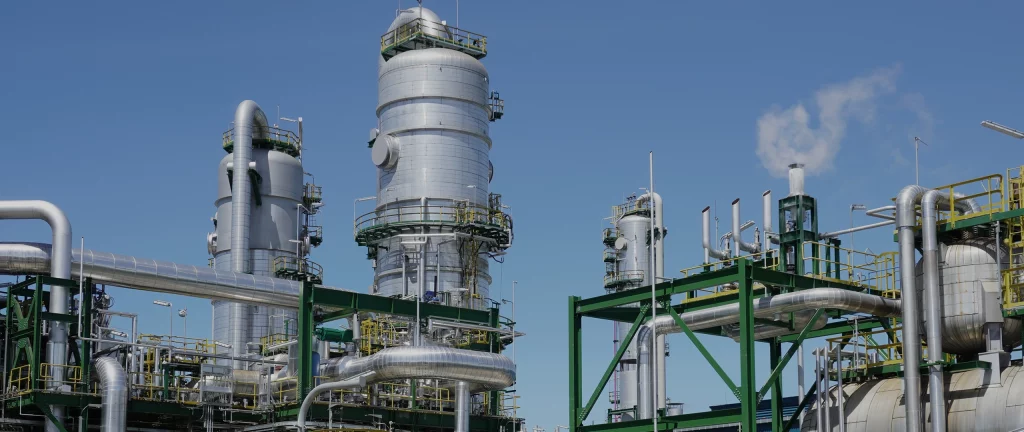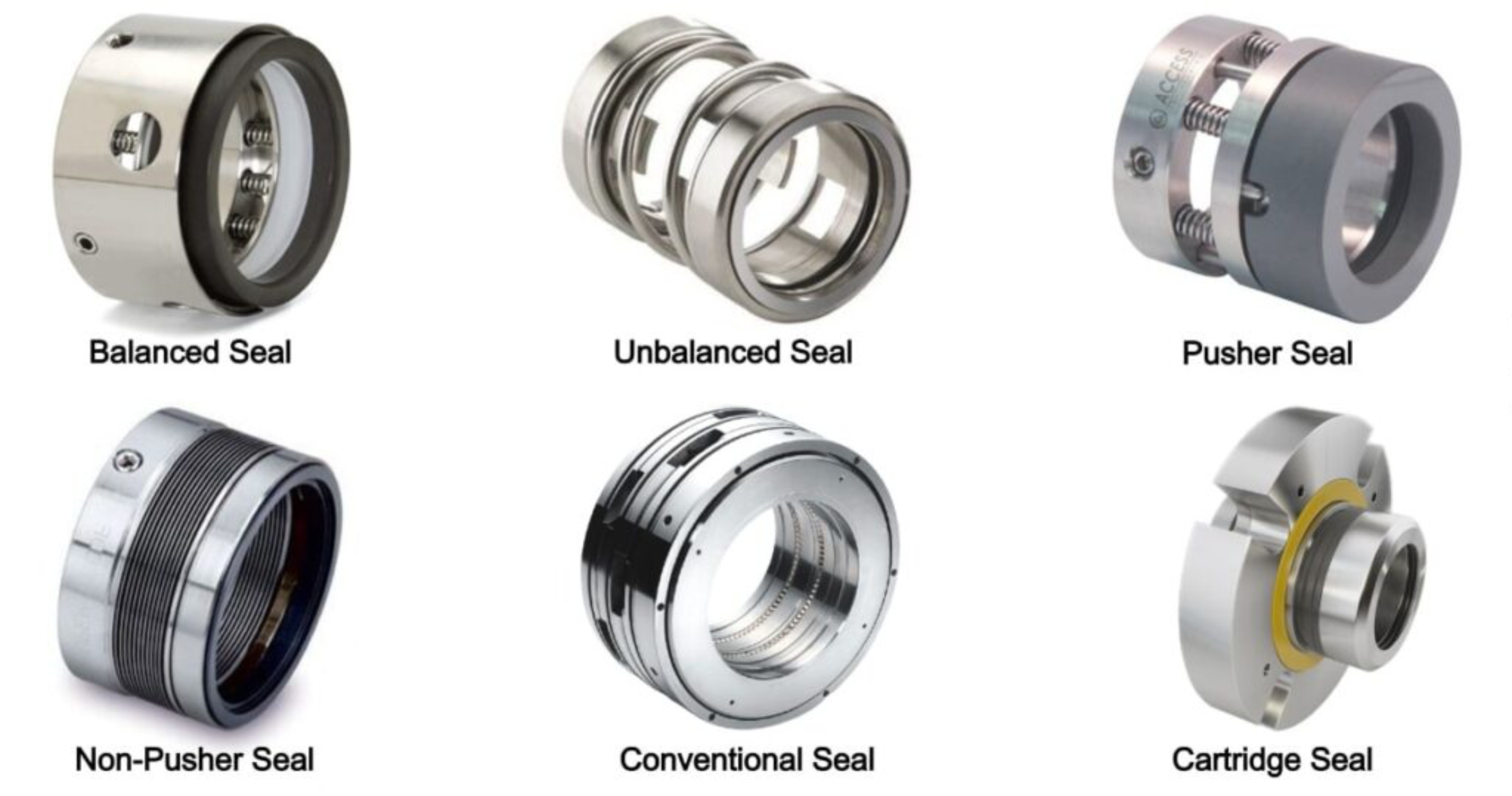Different types of mechanical seals and industrial sealing solutions
Different types of mechanical seals and industrial sealing solutions
In rotating equipment, various types of mechanical seals or sealing are used to prevent leakage of fluids (such as liquids or gases) and maintain the integrity of the system.
Different types of mechanical seals and industrial sealing solutions
In rotating equipment, various types of mechanical seals are used to prevent leakage of fluids (such as liquids or gases) and maintain the integrity of the system.
Mechanical seals are devices used to prevent fluid leakage between two rotating or reciprocating components in a mechanical system. They find widespread use in various industries, such as pumps, compressors, and agitators. Different types of mechanical seals are designed to meet specific requirements based on the application and operating conditions. Here are some common types of mechanical seals:
- Single Spring Mechanical Seal:
- Simple design with a single coil spring.
- Suitable for less demanding applications.
- Multiple Spring Mechanical Seal:
- Features multiple coil springs for enhanced stability and sealing performance.
- Used in applications with higher pressures and temperatures.
- Cartridge Mechanical Seal:
- Pre-assembled unit that includes all the components needed for sealing.
- Easy to install and replace, reducing downtime.
- Split Mechanical Seal:
- Designed for easy installation without the need to disassemble the equipment.
- Suitable for applications where space is limited.
- Metal Bellows Mechanical Seal:
- Uses a flexible metal bellows instead of a spring for axial movement.
- Ideal for applications with high temperature and pressure variations.
- Elastomer Bellows Mechanical Seal:
- Utilizes an elastomeric bellows for sealing flexibility.
- Resistant to corrosive and abrasive fluids.
- PTFE (Polytetrafluoroethylene) Mechanical Seal:
- Incorporates PTFE as a sealing material, providing excellent chemical resistance.
- Suitable for corrosive and aggressive fluid applications.
- Gas-lubricated Mechanical Seal:
- Uses a gas, typically nitrogen, as a lubricating medium between the sealing faces.
- Ideal for high-speed and high-temperature applications.
- Agitator Mechanical Seal:
- Specifically designed for agitator applications, ensuring effective sealing in mixing equipment.
- Mixer Mechanical Seal:
- Designed for mixers and blenders, providing reliable sealing during mixing processes.
- Dry Running Mechanical Seal:
- Operates without a continuous supply of liquid, suitable for applications with intermittent fluid flow.
- Externally Pressurized Mechanical Seal:
- Uses an external source to maintain a higher pressure in the seal chamber, preventing leakage.
- Slurry Mechanical Seal:
- Designed to handle abrasive and viscous slurry fluids.
- High-Pressure Mechanical Seal:
- Engineered to withstand and seal in applications with extremely high pressures.
- Non-Pusher Mechanical Seal:
- Features a stationary design without a dynamic secondary sealing element.
The selection of a mechanical seal type depends on factors such as the type of fluid, pressure, temperature, speed, and the specific requirements of the application. It's important to choose the right mechanical seal to ensure optimal performance and reliability in a given system.

Different types of industrial sealing solutions
Industrial sealing solutions encompass a broad range of products designed to prevent leakage, contamination, and environmental impact in various industrial applications. These solutions are crucial for maintaining the integrity and efficiency of machinery and processes. Here are different types of industrial sealing solutions:
- Gaskets:
- Flat or shaped components placed between two surfaces to prevent fluid or gas leakage.
- Materials vary based on application, including rubber, cork, metal, and composite materials.
- O-Rings:
- Circular elastomeric seals typically used in static and dynamic applications.
- Provide effective sealing against fluids and gases in various industries.
- Lip Seals (Oil Seals):
- Used to seal lubricants and prevent the ingress of contaminants in rotating shaft applications.
- Commonly employed in automotive, industrial, and agricultural machinery.
- Radial Shaft Seals:
- Designed to seal rotating shafts against the intrusion of dust, dirt, and other contaminants.
- Often used in equipment such as pumps, motors, and gearboxes.
- Diaphragm Seals:
- Flexible barrier membranes used to isolate pressure-measuring instruments from the process fluid.
- Commonly employed in pressure gauges and transmitters.
- Expansion Joints:
- Flexible connectors that absorb movement, shock, and vibration in pipelines.
- Prevent damage to equipment caused by thermal expansion, contraction, or misalignment.
- Mechanical Seals:
- Used to prevent fluid leakage between rotating or reciprocating components in machinery.
- Commonly found in pumps, compressors, and agitators.
- Packing Seals (Compression Packing):
- Braided or molded materials inserted into a stuffing box to prevent fluid leakage in rotating equipment.
- Widely used in valves, pumps, and other rotary equipment.
- Flange Gaskets:
- Seals placed between flanged pipe connections to prevent leakage.
- Made from various materials such as rubber, PTFE, or metal.
- Static Seals:
- Seals designed for stationary or non-moving parts to prevent leakage between components.
- Examples include gaskets and flat seals.
- Dynamic Seals:
- Seals used in moving parts to prevent leakage and maintain lubrication.
- Examples include O-rings, lip seals, and mechanical seals.
- PTFE Seals:
- Seals made from polytetrafluoroethylene (PTFE), known for its excellent chemical resistance and low friction properties.
- Commonly used in applications requiring resistance to aggressive chemicals.
- High-Temperature Seals:
- Seals specifically designed to withstand elevated temperatures.
- Materials such as silicone, graphite, and ceramics are often used for high-temperature applications.
- Cassette Seals:
- Pre-assembled sealing units that include multiple sealing components for easy installation and replacement.
- Commonly used in industries such as mining and pulp and paper.
- Fire Seals:
- Sealing solutions designed to withstand and prevent the spread of fire and smoke in buildings and industrial facilities.
- Used in fire doors, walls, and HVAC systems.
The choice of an industrial sealing solution depends on factors such as the application, operating conditions, temperature, pressure, and the specific requirements of the equipment or system. Proper sealing is essential for ensuring the safety, efficiency, and longevity of industrial processes and equipment.
Contact us to safeguard Cell: +91-8433777035 or Email: info@sealomech.com

